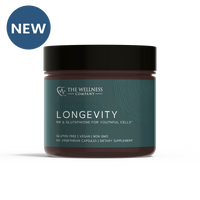The Diabetes Drug Trending on Tik Tok: Understanding the Ozempic Fad.

By Dr. Richard Amerling, MD
Chief Academic Officer of The Wellness Company
It isn’t often that a diabetes drug is trending on Tik Tok. But such is the case for Ozempic (also called Wegovy or Semaglutide), an injectable glucagon-like peptide (GLP-1) used in the treatment of Type 2 diabetes.
While the drug has been around since 2017, it has recently gained widespread notoriety thanks to Entrepreneur Elon Musk, who – when asked about his recent ripped physique – credited Ozempic (and fasting) as his secret.
Around the same time, Tik Tokers began speculating that Kim Kardashian used Ozempic as part of a recent weight loss regimen.
This Hollywood-induced notoriety has created an unprecedented demand for the drug, which has resulted in nation-wide shortages, according to the FDA.
But is Ozempic really the magic obesity drug that celebrities are making it out to be? Or is it just another fad with dangerous side-effects? To understand this trend, it’s important to appreciate the mechanism by which these drugs are purported to work and to be informed on the research behind it.
GLP-1 is a hormone produced by special cells in the small intestine in response to the absorption of nutrients from a meal. It stimulates the release of insulin by the pancreas, thus lowering blood sugar. Other effects include slowing emptying of the stomach and decreasing food intake. The latter is presumed to be the mechanism by which weight loss is produced by the various GLP-1 analogues like Ozempic.
Efficacy of GLP-1 analogues in Type 2 diabetes and obesity has been established by several Pharma-sponsored trials. In these studies, average blood glucose, assessed by the HbA1c, and weight are both lowered. However, as noted in UpToDate, “there are no comparative trials, evaluating the effects of different GLP-1 receptor agonists on patient-important, long-term outcomes such as diabetic complications, health-related quality of life, or mortality.
There are a number of comparative trials with glycemia as the primary outcome and some with weight loss as a secondary outcome. Neither of these trials comparing any of these drugs to a low carb high fat (LCHF) diet. Nor will there ever be, as the results will almost certainly be unfavorable to the Pharma sponsors.
When evaluating the efficacy of any drug, it’s critical to understand the degree to which it reduces absolute risk of negative outcomes in those taking it. Again, from UpToDate: “In a meta-analysis of trials comparing a GLP-1 receptor agonist (lixisenatide, once weekly exenatide, albiglutide, liraglutide, semaglutide) with placebo in people with diabetes and established CVD, GLP-1 receptor agonists reduced the risk of cardiovascular mortality (39 versus 44 events per 1000 persons).” This is a trivial absolute risk reduction of 0.5%! This begs the question: is a 0.5% absolute risk reduction worth the potential side effects?
Gastrointestinal side effects are common with these drugs, typically nausea and vomiting. Pancreatitis is a potentially fatal complication of GLP-1 agonists. In the Novo Nordisk study of semaglutide for weight loss, 90% of subjects had adverse events; 10% had serious adverse events.
While GLP-1 agonists can be useful in the management of patients with Type 2 diabetes, we are not endorsing them in the latest weight loss fad. Here’s why:
- The pharmaceutical approach to weight loss has never produced durable long-term results, and this will be no exception. It’s clear the effect of this band aid will be lost once the drug is stopped.
- At The Wellness Company, we seek to understand the underlying cause of disease and to intervene at that level to reverse it, rather than to treat symptoms or numbers.
- Obesity is mostly due to overconsumption of toxic processed foods that contain sugar, high fructose corn syrup, “vegetable” seed oils such as canola and soybean, and frequent snacking. It is readily reversed by avoiding these “foods,” and by time-limited eating (intermittent fasting).
- Diabetes reversal by diet is not difficult and highly successful. TWC is offering a package to do just that.
- The mechanism of action of GLP-1 agonists, increasing insulin secretion, is problematic in patients who already have high insulin levels. The weight loss mechanism is non-physiological.
- Side effects are significant and, as always, downplayed in pharma-sponsored trials.
- Expensive! $900/month is better spent on healthy food and nutraceuticals.
The Pharma approach to weight loss goes against the grain at The Wellness Company, where deprescribing is in our DNA. We are inherently distrustful of any health fad. Let’s see some reliable data and wait a few years to see how things progress over time.
The conservative approach is best.
- - - - - - - - - - - - - - - - - - - - - - - - - - - - - - - - - -
About the Author:
Dr. Richard Amerling is a consultant Nephrologist/Internist with over 30 years experience. He specializes in diseases of the kidney, metabolic syndrome, diabetes mellitus, and hypertension. He is on the Chief Medical Board of The Wellness Company founded in 2022.
His areas of specialty include:
- Dialysis, including peritoneal and home dialysis
- Chronic kidney disease
- Metabolic syndrome
- Transplantation
- Metabolic bone disease
- Guideline critiques
- Health care economics and politics














